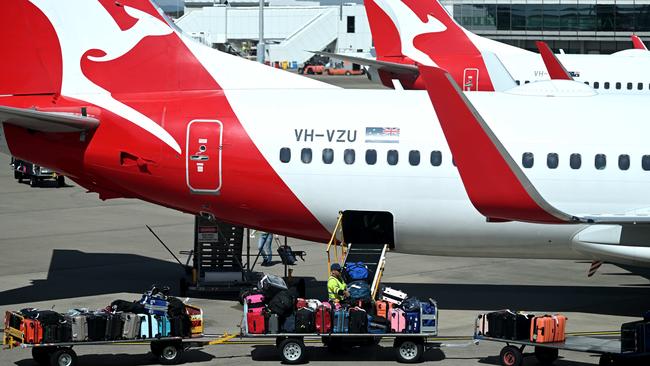Federal Court judge unloads on Qantas over unlawful outsourcing in final hearing
In a final hearing to determine compensation for affected workers, a Federal Court judge has let fly at Qantas over the airline’s unlawful outsourcing.
In a lively final hearing to determine compensation for the affected workers, Federal Court judge Michael Lee said Qantas “reverse engineered” its outsourcing decision.
The outsourcing of 1683 ground handling workers at the height of the Covid-19 pandemic was in 2021 found to be unlawful by Justice Lee, after the Transport Workers Union successfully argued Qantas was motivated by a desire to avoid industrial action.
Qantas appealed against the decision to the Full Federal Court and the High Court, but the original ruling was upheld.
The airline and union were then ordered into mediation to determine compensation for the affected workers but the talks failed.
In the absence of an agreement the matter returned to the Federal Court, which heard what might have happened to that workforce if the illegal outsourcing had not occurred.
Qantas argued the workers would have been outsourced anyway – if not in 2020 then in 2021 – while the TWU claimed they would have continued in their jobs until retirement.
As Qantas barrister Richard Dalton, KC, made his final submissions on the “inevitable” outsourcing, Justice Lee said there was a “high degree of artificiality” about the decision reached in 2020.
“It’s all very carefully done but the fact is it seems to me Qantas was intent on doing everything it could, irrespective of how it affected employees, and if it meant getting rid of them it was going to get rid of them,” Justice Lee said.
“If one looks at the entire suite of communications, this is all reverse engineered (by Qantas).
“We’re instructing lawyers to give us advice as to how we best minimise our risks, we’ll put on affidavits that bear no resemblance to the reality and assume the judge came down in the last shower.”
Justice Lee highlighted that there was even discussion with solicitors about putting in place a regime to select a sole decision maker who could best withstand a legal challenge.
“It’s as plain as day that’s what happened,” Justice Lee said.
“They knew there would be a court case and wanted to minimise their legal risk. What does cause me concern was that evidence was presented to the court which does not, frankly, disclose that reality.”
Mr Dalton said advice taken from lawyers and industrial relations experts in early 2020 was simply aimed at weighing up the risks of outsourcing against the commercial rewards.

He told the court the TWU argument that ground handling workers would have remained in their jobs if the outsourcing had not occurred, was “very weak” and “unrealistic”.
Philip Boncardo, for the TWU, said the Qantas case ignored the facts, which were if the outsourcing was not undertaken in 2020 because it was unlawful, it was unlikely to have been revisited in 2021.
“Your Honour could not be satisfied that the same decision could have been made lawfully,” Mr Boncardo said.
Justice Lee said there was a significant amount of artificiality about the way Qantas had presented its original defence, and “that lack of realism persists today”.
“I think there was a corporate will at the highest levels to proceed along these paths,” Justice Lee said.
“That’s the reason I made the findings I did at the reinstatement hearings (that the workers would’ve been outsourced as soon as possible).”
Matthew Follett, SC, also for Qantas, took up the argument around what compensation should be paid to the affected workers.
He said any compensation should take into account the likelihood stand-downs would have continued in 2021 due to the lack of flying.
“The union proposes a six-month period (of stand-downs) by which future income in 2021 should be discounted; we propose eight months,” Mr Follett said.
The hearing continues on Thursday.







To join the conversation, please log in. Don't have an account? Register
Join the conversation, you are commenting as Logout